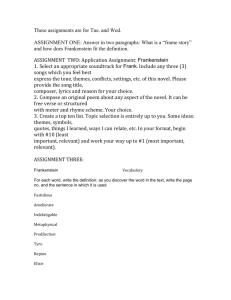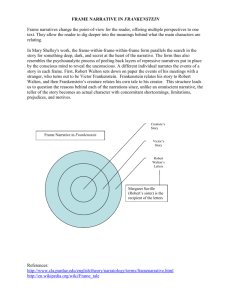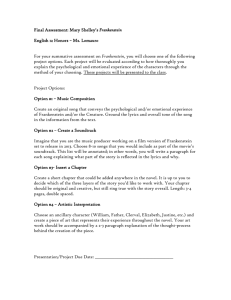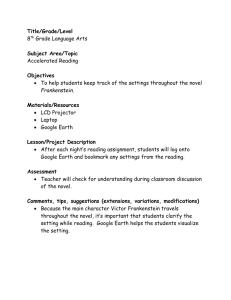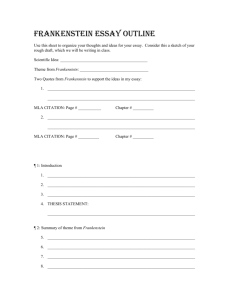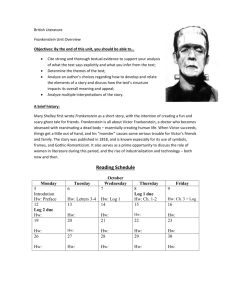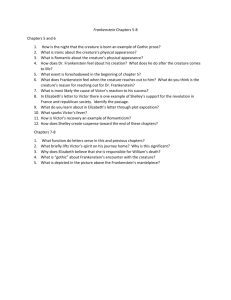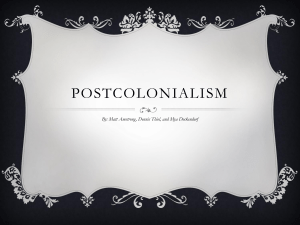Frankenstein Study Questions: Letters & Chapters
advertisement
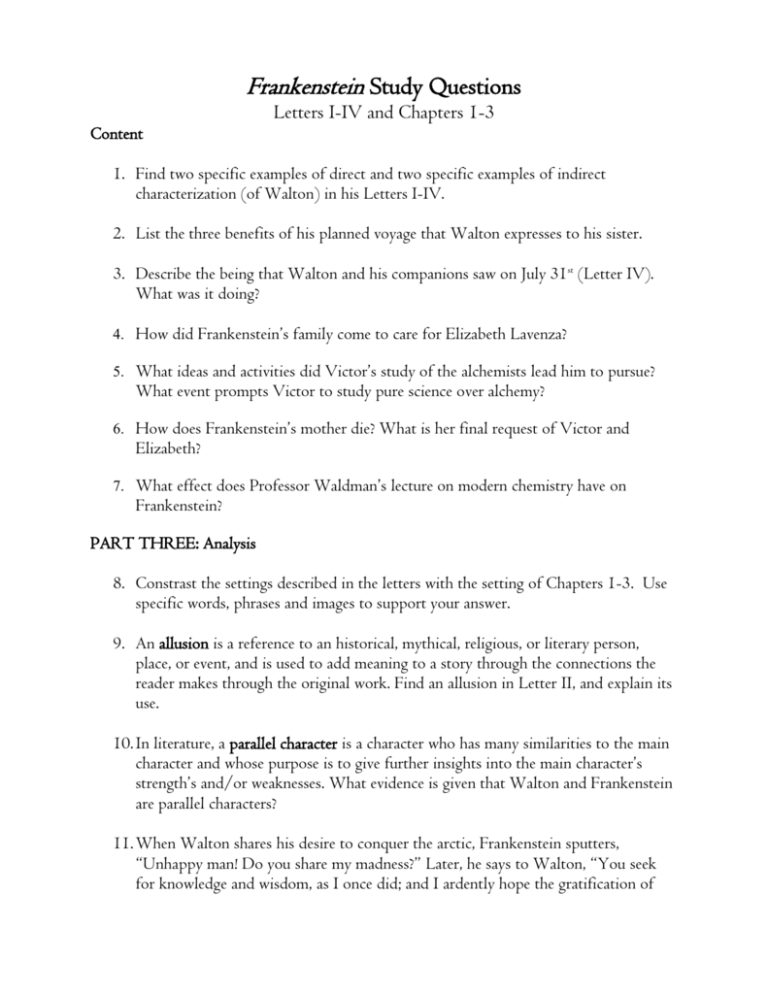
Frankenstein Study Questions Letters I-IV and Chapters 1-3 Content 1. Find two specific examples of direct and two specific examples of indirect characterization (of Walton) in his Letters I-IV. 2. List the three benefits of his planned voyage that Walton expresses to his sister. 3. Describe the being that Walton and his companions saw on July 31st (Letter IV). What was it doing? 4. How did Frankenstein’s family come to care for Elizabeth Lavenza? 5. What ideas and activities did Victor’s study of the alchemists lead him to pursue? What event prompts Victor to study pure science over alchemy? 6. How does Frankenstein’s mother die? What is her final request of Victor and Elizabeth? 7. What effect does Professor Waldman’s lecture on modern chemistry have on Frankenstein? PART THREE: Analysis 8. Constrast the settings described in the letters with the setting of Chapters 1-3. Use specific words, phrases and images to support your answer. 9. An allusion is a reference to an historical, mythical, religious, or literary person, place, or event, and is used to add meaning to a story through the connections the reader makes through the original work. Find an allusion in Letter II, and explain its use. 10. In literature, a parallel character is a character who has many similarities to the main character and whose purpose is to give further insights into the main character’s strength’s and/or weaknesses. What evidence is given that Walton and Frankenstein are parallel characters? 11. When Walton shares his desire to conquer the arctic, Frankenstein sputters, “Unhappy man! Do you share my madness?” Later, he says to Walton, “You seek for knowledge and wisdom, as I once did; and I ardently hope the gratification of your wishes may not be a serpent to sting you, as mine has been.” What might this be foreshadowing? 12. Frankenstein is an example of the gothic novel, characterized by an emphasis on the mysterious and supernatural. What gothic images are found in the letters and the first 3 chapters? 13. Frankenstein may also be classified as a romantic novel. Some conventions of the romantic novel include: - lofty and elevated language - emphasis on adventure - emphasizes the importance of emotion, imagination (rather than reason and science) - exotic locations - passionate love - heroic events - a concentration on the past are typical of the romantic novel. Identify at least five specific elements or examples in the Letters and Chapters 13 that are ‘romantic’. 14. “Hubris” is a Greek word describing pride so excessive that it must, necessarily, lead to a character’s downfall. Is there evidence in the letters that Walton may suffer from hubris? Explain. Frankenstein Study Questions Chapters 4-10 CONTENT 1. How does Frankenstein’s work on his creation affect him physically, mentally and spiritually? 2. Why does Frankenstein despise his creation? What does this reveal about his personality? 3. What immediate effect does Clerval’s appearance in Ingolstadt have on Frankenstein? 4. What brings Frankenstein home to Geneva? 5. What does Frankenstein see during the storm at Plainpalais as he travels to Geneva? What conclusion does he reach after this appearance? 6. Why doesn’t Frankenstein reveal his suspicions about the murder? How does his silence affect him? 7. How does Frankenstein receive comfort? How is this a Romantic notion? ANALYSIS 8. Describe the weather on the night that Frankenstein brings his creation to life. What is this literary device called? Why might the author have set the creature’s awakening during this kind of weather? 9. Irony can be described as the difference between what is expected and what actually occurs. How is Frankenstein’s successful creation of the monster ironic? 10. Did Frankenstein know what he was doing was wrong? Explain. 11. In Chapter 9, Frankenstein considers drowning himself. (“I was tempted to plunge myself into the silent lake, that the waters might close over me and my calamities forever.”) Why does he hold back? Do you think his reasons are selfless or selfish? Explain. 12. About the deaths of Justine and William, Frankenstein says, “I, not in deed, but in effect, was the true murderer.” Do you agree or disagree? Explain. 13. In Chapter 10, the monster says, “I was benevolent and good; misery made me a fiend.” Those in the Romantic movement believed that man was born good, but societal pressures created evil in man. What is your opinion? Are people naturally good? If so, why do they turn evil? 14. To whom or what does the monster assign responsibility for his actions—whom does he blame? Do you agree with his assessment? Frankenstein Study Questions Chapters 11—22 Content/Analysis 1. Romanticism emphasized imagination, freedom, and the beauty of the natural world. How do the De Lacey’s epitomize the ideal Romantic family? 2. In Chapter 15, the monster tells of the books he discovered. What does the monster learn from these books? 3. Explain the significance of the allusion to Paradise Lost. 4. Select one event from Chapters 11-16 and explain how it illustrates the view that people are naturally good and virtuous, but that society is to blame for turning people evil. 5. Review the monster’s reason for asking for a female companion like himself, then review Frankenstein’s reasons for deciding to destroy the second creature. With whom do you sympathize most? 6. Explain the following allusion: “but the apple had already been eaten, and the angel’s arm bared to drive me from all hope”? Frankenstein Study Questions Chapters 23-24, Final Letters Content 1. At the death of Elizabeth, Frankenstein says, “Life is obstinate, and clings closest where it is most hated.” What does he mean by this? 2. Why do you think the creature leaves food and notes for Frankenstein? 3. Knowing that his life is “hateful,” why does Frankenstein simply not allow himself to die? 4. What, according to the creature, is missing from Frankenstein’s tale? Analysis 5. Is Frankenstein a reliable or unreliable narrator? Why? 6. What does the creature say that points to the Romantic idea that people are naturally good, until corrupted by society? 6. Did revenge satisfy either Frankenstein or his creation? Were either made happy by it? What theme emerges from this? 7. In his final speech, the creature levels an accusation against the human race, deploring the fact that he is thought a criminal while all those who harmed him are not. Is the creature justified in making this complaint? Explain.
